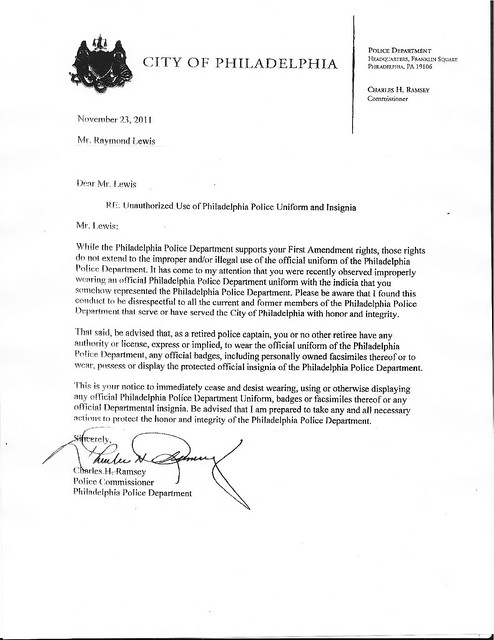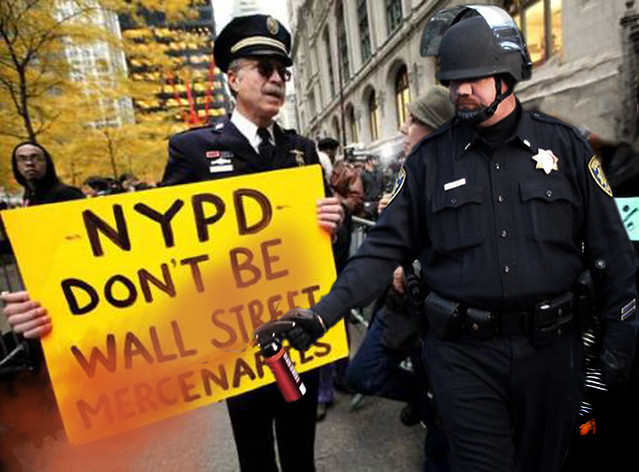
EDITOR’S NOTE: This interview originally ran back in December. We are re-running it today on the occasion of Captain Ray Lewis speaking today at a noontime OccupyPhilly rally at Independence Mall.
 BY JONATHAN VALANIA Ray Lewis, a retired Philadelphia Police captain with 24 years of service under his belt, created some of the most iconic imagery of the Occupy Wall Street protests by showing up at Zuccotti Park in his uniform with a sign that read: NYPD, WATCH ‘INSIDE JOB,’ JOIN US. Footage of his high profile arrest outside the New York Stock Exchange went viral, and he quickly became catnip for the media and was hailed as a hero by Occupy sympathizers. But not everyone was pleased with his actions. Two weeks ago he received letters from Philadelphia Police Commissioner Ramsey and the Fraternal Order Of Police telling him to cease and desist showing up at OWS protests in uniform. Although the letters did not say so explicitly, Lewis says the subtext of the letters was that he would be stripped of his pension and/or arrested for impersonating an officer if he did not comply. Lewis’ response? Bring it on. On Friday we got Lewis on the horn to discuss all the above.
BY JONATHAN VALANIA Ray Lewis, a retired Philadelphia Police captain with 24 years of service under his belt, created some of the most iconic imagery of the Occupy Wall Street protests by showing up at Zuccotti Park in his uniform with a sign that read: NYPD, WATCH ‘INSIDE JOB,’ JOIN US. Footage of his high profile arrest outside the New York Stock Exchange went viral, and he quickly became catnip for the media and was hailed as a hero by Occupy sympathizers. But not everyone was pleased with his actions. Two weeks ago he received letters from Philadelphia Police Commissioner Ramsey and the Fraternal Order Of Police telling him to cease and desist showing up at OWS protests in uniform. Although the letters did not say so explicitly, Lewis says the subtext of the letters was that he would be stripped of his pension and/or arrested for impersonating an officer if he did not comply. Lewis’ response? Bring it on. On Friday we got Lewis on the horn to discuss all the above.
But before we get to that, let me tell you about a couple of Philadelphia Police Officers who DIDN’T lose their pensions. Exhibit A is Officer Tyrone Higgins who sexually abused a 12 year old girl he was mentoring — beating her, forcing her to perform oral sex and anally raping her– for EIGHT YEARS. After a two year investigation, Higgins was allowed to resign from the force exactly one day before he was arrested for sexual assault, thereby ensuring that he would not lose his pension. Even if convicted. Which he was. THAT guy got to keep his pension.
Exhibit B is Officer Walter Helinsky, who sexually abused a 13 old girl more than 100 times and was sentenced to eight years in prison. THAT guy got to keep his pension, until the Daily News found out about and made a big stink and basically shamed the Philly PD into stripping his pension.
Exhibit C is Adrian Makuch, a former crime-scene-unit officer who pleaded guilty in 2010 to attempting to lure a child into a motor vehicle, unlawfully contacting a minor, and patronizing a prostitute and was sentenced to 11 1/2 to 23 months in prison. Pension: $2,203.56 a month since 1/4/2010. Because the crimes were not conducted on city time, his $2,203.56 per month pension was not forfeited.
Meanwhile Ray Lewis goes down to Zuccotti park wearing his dress blues and carrying a sign that says JOIN US, and gets threatened with arrest and losing by the chief of police and the FOP? Seems to me, if they were any kind of cops, Higgins and Hilensky would have been arrested for impersonating an officer a long time ago.
PHAWKER: How did you wind up joining the Occupy Wall Street protesters in Zuccotti Park? Have your political views changed in recent years or were you always sympathetic to progressive causes?
CAPTAIN RAY LEWIS: Always, I was a protestor against the Vietnam War. I always realized how crooked and corrupt government is. In joining the police force though, I realized it was a tremendous way to help people and every day it gave me immediate gratification and reward for my job and that’s what I wanted, I could not stand boring jobs. Subsequently I did police work in a very professional and respectful manner and I can see how it positively affected people by being truly concerned about their problems and taking the extra step to help them.
PHAWKER: Now I’m assuming your perspective wasn’t necessarily shared by your fellow police officers.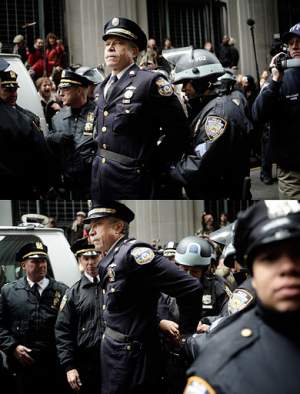
CAPTAIN RAY LEWIS: That is correct.
PHAWKER: Did you keep your politics to yourself or was this a source of debate?
CAPTAIN RAY LEWIS: Pretty much, yeah. I did interject every once in a while when I saw I could have a little bit of impact but I basically kept them to myself, yes.
PHAWKER: Tell me how you wound up going down to Zuccotti Park. You saw the protests on TV?
CAPTAIN RAY LEWIS: I don’t get any news from corporate media, and that includes television, radio or newspapers. My sole source of information is the Internet and I found the Occupy Wall Street protests extremely interesting. I followed Zuccotti Park from the mountains and in seeing what was happening – often times if I railed against corruption it was like I was a loose cannon, a fruit loop just out there by myself saying how corrupt everything is. Then when I saw all these people occupying Zuccotti Park and what they were sacrificing, the way they were living, their conviction came out so strong for social justice and they were just tired of it. They set out to change it and I wanted to help. So I packed my bags to come [to NYC] and I arrived on Monday the November, 14th, the day before they were evicted. I came down late, I had just unpacked my bag, I was staying at a rather inexpensive hotel in Harlem. I just chilled for the evening. The next morning I went down to Zuccotti Park. First I went down in just civilian clothes, not the uniform or anything. I wanted to check it out, exactly where I was going, how I was going to approach, things of that nature. So I went down in the morning and I was shocked to see the park completely empty. Where did everybody go? I saw a few people walking around with signs and asked, “What happened?” and they told me about the atrocious event that happened to clear everybody out and I was quite shocked at that. But then people started to come back and congregate around the barriers of the park and so I said, “Ok, I can still be effective.” I went back to my hotel room, got dressed – I always wear a black raincoat on top of my uniform. I never travel to and from anywhere in my uniform, I always have a black raincoat covering it. So I took my sign with me.
PHAWKER: This is the one that says, ‘NYPD Watch ‘Inside Job Then Join Us?’
CAPTAIN RAY LEWIS: No that’s the latest, the first sign I carried said “NYPD: Don’t Be Wall Street Mercenaries.”
PHAWKER: OK, so you go down to Zuccotti Park and what happens next?
CAPTAIN RAY LEWIS: First I was approached by a plain clothes officer and he told me in a very stern way, “Just step to the curb.” I responded, “You show me your authority to order me to step to the curb and I will.” Boy, did that piss him off. He goes, “I said,” clenching his teeth, “step to the curb.” I said again, “You show me your ID authorizing your authority and I will move to the curb.” Then he said it one more time so sternly, and I knew that I was gonna refuse that I realized he might go mano y mano with me and I was prepared to do a match up, but I wanted it on camera. A number of people are around, everybody has a video camera obviously, cell phones take pictures, so I said “Hang on buddy, you might wanna get pictures of this,” which [the plainclothes officer] obviously detested. Then he backed off and called a white shirt over, obviously seeing the white shirt I realized he had authority, I went to the curb and I showed him my ID. That was resolved right then and there without any other further injury. About a half hour later a white female captain pointed at me and told me, “We’re on the phone with Philadelphia now. We’re going to get you.” Another half hour after that, a police chief approached me and put his finger into my chest, saying “We might not get you today or tomorrow, but you’re toast.” That’s the greeting I had from the NYPD, nobody ever approached me and asked, ‘We’d like to know what you’re about here, it’s interesting. Would you be willing to talk to us for a few minutes? Do you represent the Philadelphia police department officially’ or anything like that, it was just immediate confrontation.
PHAWKER: Explain the circumstances of you getting arrested.
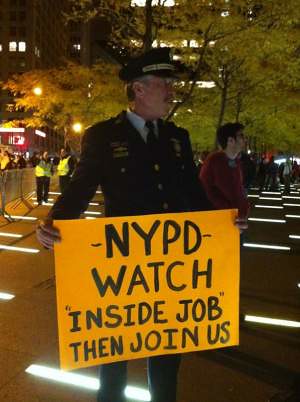 CAPTAIN RAY LEWIS: It was the Shut Down Wall Street protest two days after the Occupy was evicted from Zuccotti Park. There were a lot of people protesting, I went down just to support the protest and wave my sign. Then I saw these young people getting arrested for civil disobedience, for sitting in the street and not moving. Seeing them all being willing to give up their freedom for who knows how long, overnight, a couple days, didn’t matter – they were also willing to give it up and to risk their personal welfare. They do not know what will be done to them when the cameras aren’t around, nevertheless they were willing to risk their their freedom, and perhaps their personal welfare for social justice. That to me was so inspiring, their show of conviction that almost immediately – I’m not a real spontaneous person, I’m more of a planner but their conviction, their energy just hit me and I said, “Ah, I gotta be arrested.” So I gave my sign to a reporter who told me she’d hold it and give it back to me later and I went out there and sat down. Initially the police walked around me, I’m not sure if that was a show of respect and camaraderie but it may just as well been a show of not wanting to publicize the event, which they knew arresting me would. I sat down several times and they still refused to arrest me. On the fourth time they realized, ‘This guy’s not gonna stop, he’s gonna force us to arrest him,’ which they then did. I did not go limp, I stood up, I know what it’s like and didn’t want to make the job harder for them, I didn’t wanna agitate them, I was only sharing in the civil disobedience and bringing attention to the demonstration. I walked across the intersection with hundreds and hundreds of people cheering me on, it was the proudest moment of my life. So I was led across and sat down with all the other protestors and from there on, I was treated exactly the same as every other protester.
CAPTAIN RAY LEWIS: It was the Shut Down Wall Street protest two days after the Occupy was evicted from Zuccotti Park. There were a lot of people protesting, I went down just to support the protest and wave my sign. Then I saw these young people getting arrested for civil disobedience, for sitting in the street and not moving. Seeing them all being willing to give up their freedom for who knows how long, overnight, a couple days, didn’t matter – they were also willing to give it up and to risk their personal welfare. They do not know what will be done to them when the cameras aren’t around, nevertheless they were willing to risk their their freedom, and perhaps their personal welfare for social justice. That to me was so inspiring, their show of conviction that almost immediately – I’m not a real spontaneous person, I’m more of a planner but their conviction, their energy just hit me and I said, “Ah, I gotta be arrested.” So I gave my sign to a reporter who told me she’d hold it and give it back to me later and I went out there and sat down. Initially the police walked around me, I’m not sure if that was a show of respect and camaraderie but it may just as well been a show of not wanting to publicize the event, which they knew arresting me would. I sat down several times and they still refused to arrest me. On the fourth time they realized, ‘This guy’s not gonna stop, he’s gonna force us to arrest him,’ which they then did. I did not go limp, I stood up, I know what it’s like and didn’t want to make the job harder for them, I didn’t wanna agitate them, I was only sharing in the civil disobedience and bringing attention to the demonstration. I walked across the intersection with hundreds and hundreds of people cheering me on, it was the proudest moment of my life. So I was led across and sat down with all the other protestors and from there on, I was treated exactly the same as every other protester.
PHAWKER: So they put you in handcuffs, I actually saw some camera phone footage of you being arrested, I also saw a picture of you sitting on the curb leaning up against the wall for a while?
CAPTAIN RAY LEWIS: Yes, yes.
PHAWKER: So what happens next? They put you in cuffs, you’re sitting on the wall waiting to be put in the big bus?
CAPTAIN RAY LEWIS: Exactly, then they took me down along with everybody else down to their detention charging unit, there we waited outside in the courtyard because there were so many people they could only have a small number going in at a time to the actual processing area, so all of us were waiting outside in the courtyard. Just a little side thing here, when the officer asked for my ID, and we’re still cuffed at this time, I couldn’t reach my wallet so I asked her to take it out because my driver’s license was in there and she looked at it and she’s writing down my information and my date of birth, and she goes, “Oh my, it’s your birthday!” The fellow next to me, another arrested protestor, heard that so he calls a mic check and announced it was my birthday, next thing you know there’s 80 people singing loudly and joyously happy birthday to me. I thought that was really great. So anyway, when the officer was done with my ID she moved to the fellow next to me and he told her, “Do you know that you’re gonna be the answer to a trivia question one day? You’re gonna be ‘Who was the officer who arrested Captain Ray Lewis.’” I don’t know if she totally got that but he did. Anyway, it was finally our turn to go into the actual processing unit and there was a gentleman sitting in there at a desk, he looked up and asked me, “Captain, how many arrestees do you have?” He thought I was a captain in the NYPD and I said, “I don’t have any, I’m a prisoner.” He didn’t understand that so he repeated himself, “No, no, I’m asking how many prisoners do you have?” Then I just turn my back and show him the handcuffs, if you could have seen the look on his face, I wish I had a camera then.
PHAWKER: He thought you were NYPD?
CAPTAIN RAY LEWIS: Yeah, even though my uniform is different from the NYPD I guess that didn’t click with him. It was so weird to think I was not NYPD, 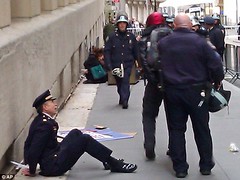 it was weird for him to think that I was actually a Philadelphia police captain being arrested that his mind couldn’t go there, it would have been such cognitive dissonance that his mind absolutely took him to the fact that I was some kind of special NYPD higher-up with my different uniform, I guess. But anyway, when I showed him my cuffs he was shocked. The arresting officer behind me nodded and told him “He’s an arrestee.” Then I was processed like everyone else in the line. I was put into a jail cell and I waited there for about 10 hours before I was released.
it was weird for him to think that I was actually a Philadelphia police captain being arrested that his mind couldn’t go there, it would have been such cognitive dissonance that his mind absolutely took him to the fact that I was some kind of special NYPD higher-up with my different uniform, I guess. But anyway, when I showed him my cuffs he was shocked. The arresting officer behind me nodded and told him “He’s an arrestee.” Then I was processed like everyone else in the line. I was put into a jail cell and I waited there for about 10 hours before I was released.
PHAWKER: What’d you do for 10 hours? Play harmonica? Get a tattoo?
CAPTAIN RAY LEWIS: No, no, I’m very much into exercise and stretching, yoga, pilates, you’d be surprised how many exercises you can do besides push ups in a jail cell.
PHAWKER: Was this a big group holding cell or were they smaller cells?
CAPTAIN RAY LEWIS: There was a group holding cell, yes, but I was given a single cell.
PHAWKER: A little special treatment?
CAPTAIN RAY LEWIS: I would consider that someone making the decision to show me a little respect for my position, that’s how I would interpret that.
PHAWKER: So what were you charged with, disorderly conduct?
CAPTAIN RAY LEWIS: Three basic charges. The basics for civil disobedience: disorderly conduct, obstructing a highway, and failure to obey a police order.
PHAWKER: So you’re there for 10 hours then what happens? You’re processed, you post bail?
CAPTAIN RAY LEWIS: No bail was necessary, they released me on my own recognizance and I got a court hearing date in January. I was escorted out of the center and the officer was nice enough to walk me down to the end of the block to show me where I could get the train back to Harlem.
PHAWKER: Why were they holding you for 10 hours?
CAPTAIN RAY LEWIS: That’s not unusual. There’s a lot of paperwork involved, plus there were so many arrestees. It wasn’t bad at all.
PHAWKER: Did any of these police officers ask you why you were doing this or what this was all about?
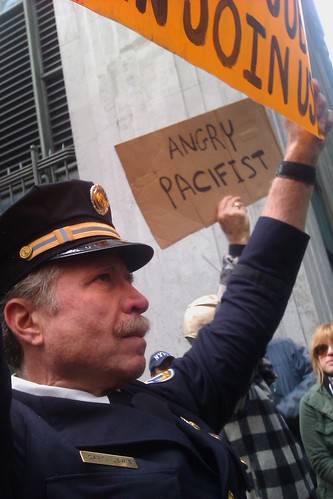 CAPTAIN RAY LEWIS: Surprisingly not a one. That surprised me, I don’t know what to make of that. Perhaps they saw me perhaps as a fruit loop, a loose cannon, who got himself arrested. I guess that was a simple interpretation of what I was doing there. You would think one person, at least the arresting officer, she would have been curious perhaps as to my intention and why did I do this, am I active or retired, but no questions whatsoever.
CAPTAIN RAY LEWIS: Surprisingly not a one. That surprised me, I don’t know what to make of that. Perhaps they saw me perhaps as a fruit loop, a loose cannon, who got himself arrested. I guess that was a simple interpretation of what I was doing there. You would think one person, at least the arresting officer, she would have been curious perhaps as to my intention and why did I do this, am I active or retired, but no questions whatsoever.
PHAWKER: Why do you think it makes them so angry that you’re there in uniform?
CAPTAIN RAY LEWIS: Several reasons, we’re not speaking about all of them by the way, some are angry, there might be some thinking, “way to go captain, keep it up.” Those that are angry, that can stem from the fact that number one, they do not identify with these protesters whatsoever, they have hostility towards them, they see them as the enemy. Subsequently these officers are going to see me as being a traitor. People in military operations, what you hate more than the enemy is a traitor, when one of your own goes to the enemy’s side produces more hate than the actual enemy. So there’s the protesters, the enemies, and I’m the traitor. I was critical of the [eviction from] Zuccotti Park, quite critical, and properly so I believe. So they hear these comments, they see me on YouTube condemning the operation so they take it personally.
PHAWKER: Were you involved in any other Occupy activities when you were released or did you just come home?
CAPTAIN RAY LEWIS: I spend some of my day every day at Zuccotti Park. I find that the most efficient and effective way for me to make a significant contribution to this movement is to have a healthy mix of spending actual time in Zuccotti Park in my uniform, but also giving interviews to media. They want to meet me in private or a different location because there’s too much interruption at Zuccotti Park, too many people wanting to congratulate me, that’s great and I’ll shake everybody’s hand but it does interrupt interviews and there’s a lot of noise and whatnot. For those people I meet them at different places because independent media, what you and others are doing is a tremendous tool we never had in the 60s against Vietnam. I find independent media crucial to the success of this movement. CBS, CNN, NBC, whatever, they’re not covering like this like you guys are. You guys are getting out the truth, so I find it extremely important for me to spend time with independent media. There are mainstream media I feel comfortable with, like Rachel Maddow and Keith Olbermann. A Fox reporter rushed up to me the first or second night I was there and as soon as I saw that FOX logo around her microphone I said, ‘You stay away from me, you’re a major part of the problem.’ She was stunned. I wanted nothing to do with her. We all know FOX is an acronym.
PHAWKER: For?
CAPTAIN RAY LEWIS: Full Of Xcrement. That’s an original, don’t try to steal it.
PHAWKER: Rimshot. You recently heard from the Philadelphia police department and the FOP, correct?
CAPTAIN RAY LEWIS: Correct.
PHAWKER: Walk me through this, what happened? You got a letter from [Philadelphia Police Commissioner Charles] Ramsey?
CAPTAIN RAY LEWIS: First I got a letter from the FOP. Robert Ballentine, the Recording Secretary for the Fraternal Order of Police mailed me a certified letter, a couple of days later I got a letter from the police commissioner. The letter from from Robert Ballentine of the FOP stated that they had received a grievance from Harry Vannelli, Pension Director that this grievance was unanimously voted on by the Board of Directors of the FOP to accept. They don’t state what the grievance is, they don’t get into any detail but they did say they’d get back to me. My thing is, what in the world is the Pension Director getting involved with this for? What I’m doing has nothing to do with my pension. I realized, ‘My God, they are trying to intimidate me by mentioning they accepted a grievance which certainly might be a grievance to revoke my pension.’ This is absurd, believe me, I didn’t come down here without checking certain things out. You’ll see in my response – and by response, I mean response and not reply. I did not reply to either of these two letters because I was not going to empower them by replying, I ignored both of the letters. But I did write a statement concerning them that I supplied to the press. When I say response, it was not to the two individuals who wrote those letters, it was my statement to the press in regard to those letters. Back to the letter about the pension – I cannot believe that my own union – and I still pay dues as a retiree by the way. I never crossed them, they’ve never had to defend me civilly, criminally, or even departmentally. They have never even had to defend me in any single disciplinary violation. I’ve never violated a policy or code, anybody can check my personal file to confirm that. I’m somewhat flabbergasted that they would do this.
PHAWKER: So you also got a letter from Ramsey.
CAPTAIN RAY LEWIS: That letter was extremely threatening. He told me I was unauthorized to use the uniform and my reply to that was, “You have no authorization over me,” I’m not employed by the police department, I’m not even employed by the city of Philadelphia. Subsequently you have no authorization over me. The only thing you can hold me accountable for is if I break a criminal law. There is no police department regulation or code that they can hold me accountable to because I’m no longer under their jurisdiction, you have to be employed by the PPD to be under the jurisdiction of those codes, regulations, and policies. I knew all this stuff before I went down. I even called the police department’s legal division and talked to Armando Brigande, he’s a lawyer for the PPD, the department. I explained exactly what I was going to do. The only concern I had was declining the definition of impersonating a police officer. To my knowledge, and I want to get this confirmed by him, for any criminal act you have to have two elements: intent and inarticulable act. 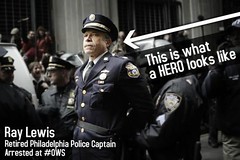 Intent means you cannot commit a crime by accident, that may be due to negligence, recklessness or whatever, but if you do something by accident it’s not actually committing a crime, plus you need both components, intent and action, not just one or the other. By announcing to everyone that I was a retired police officer, and making sure I said that first thing when anybody asks. That’s how I start every single interview, I challenge anyone to find an interview where I did not start by saying, “I am a retired police captain.” So I know I wasn’t showing any intent to have legal authority. The action, I also knew I would take no articulable action inferring that I still had legal authority. I was not going to tell the police to move the barricades, I was not going to tell a protestor to move out of an area, I was not going to tell anybody to do anything. Subsequently I am not showing any authorized power. I was feeling quite comfortable with that but I still wanted to run it past a lawyer in the PPD which I did with Armando Brigande. He fully concurred that if I did what I said I would do there would be no criminal act involved. He said, “I’m not advising you to do that, there may be repercussions, but you’re not violating any type of law.” With that assurance, I went down. The police commissioner, this goes back to him saying several things, one was the non-authorization. My response was you don’t have authorization over me, I don’t work for you anymore. Another was he thought I was disrespecting all officers, I told him I don’t care, personal opinion is meaningless to me, it has nothing to do with the legality of the issue. But the big one is he said what you are doing is improper and/or illegal. Yet he cited no statue code or policy or criminal law supporting that statement, so that tells me right there he doesn’t have any. If I was violating any type of law, the first thing he would have said is you’re violating 15-503 of the criminal code for this type of conduct or that. The fact that he mentioned no specific criminal act I was committing told me right away that this is a purely threatening, bullying, intimidation letter. He further went on then to enhance the intimidation by saying, these are extremely threatening and intimidating words and no one uses them without full knowledge of their effect. He went on to say, “I will take any and all action to protect the reputation of the PPD.” He’s going to take any and all action necessary. This is obscene that he would threaten me like that.
Intent means you cannot commit a crime by accident, that may be due to negligence, recklessness or whatever, but if you do something by accident it’s not actually committing a crime, plus you need both components, intent and action, not just one or the other. By announcing to everyone that I was a retired police officer, and making sure I said that first thing when anybody asks. That’s how I start every single interview, I challenge anyone to find an interview where I did not start by saying, “I am a retired police captain.” So I know I wasn’t showing any intent to have legal authority. The action, I also knew I would take no articulable action inferring that I still had legal authority. I was not going to tell the police to move the barricades, I was not going to tell a protestor to move out of an area, I was not going to tell anybody to do anything. Subsequently I am not showing any authorized power. I was feeling quite comfortable with that but I still wanted to run it past a lawyer in the PPD which I did with Armando Brigande. He fully concurred that if I did what I said I would do there would be no criminal act involved. He said, “I’m not advising you to do that, there may be repercussions, but you’re not violating any type of law.” With that assurance, I went down. The police commissioner, this goes back to him saying several things, one was the non-authorization. My response was you don’t have authorization over me, I don’t work for you anymore. Another was he thought I was disrespecting all officers, I told him I don’t care, personal opinion is meaningless to me, it has nothing to do with the legality of the issue. But the big one is he said what you are doing is improper and/or illegal. Yet he cited no statue code or policy or criminal law supporting that statement, so that tells me right there he doesn’t have any. If I was violating any type of law, the first thing he would have said is you’re violating 15-503 of the criminal code for this type of conduct or that. The fact that he mentioned no specific criminal act I was committing told me right away that this is a purely threatening, bullying, intimidation letter. He further went on then to enhance the intimidation by saying, these are extremely threatening and intimidating words and no one uses them without full knowledge of their effect. He went on to say, “I will take any and all action to protect the reputation of the PPD.” He’s going to take any and all action necessary. This is obscene that he would threaten me like that.
PHAWKER: What is the policy about wearing your uniform after you’ve retired from the force? Is it strictly forbidden to do that?
CAPTAIN RAY LEWIS: Not whatsoever or I would have been arrested long ago, there’s no policy about it. He says you’re not allowed to wear your uniform at any time. He’s saying if I want to fulfill a sexual fantasy with my wife I can’t, that’s how absurd his wording is. He’s saying I can’t walk to the corner store and back to my house with a gallon of milk in my uniform. That’s absurd. As long as I’m not intending to make people believe I’m an active police officer with authority. As long as I’m not performing any inarticulable act, I can walk down to the corner store and back with a gallon of milk in my uniform. There is no policy or criminal law that the wearing of the uniform after you retire absent impersonating a police officer, that’s the only law that covers that. Then again you see the two elements that are necessary for that but I never violated either one.
PHAWKER: Have you been down to Zuccotti Park in your uniform since you were arrested?
CAPTAIN RAY LEWIS: Absolutely every single day. I commute from Zuccotti Park back to Harlem at night when people want me to speak at meetings, I do different interviews through the day, documentaries, independent media, Ustream, LiveStream, whatever, there’s a lot of independent media I’m working with throughout the day and night.
PHAWKER: Your intention is to comply with the letters?
CAPTAIN RAY LEWIS: Absolutely not, if you read my statements you’ll see I have a very strong response to both of them.
PHAWKER: You’re basically saying if I’m breaking the law charge me with something, otherwise you can’t be doing this.
CAPTAIN RAY LEWIS: Absolutely yes. My statement welcomes Commissioner Ramsey to send officers up to find me and arrest me for whatever trumped up charges he can conspire. I tell him in my statement I will not resist arrest, that I can readily be found in full uniform in Zuccotti Park. I finished it by, “It’s your move, Commissioner.” I accept the challenge.
PHAWKER: Just to clarify, what is a retired police captain’s pension?
CAPTAIN RAY LEWIS: It’s all based on how many years you put in, it can range from $40,000 – $60,000 a year.
PHAWKER: What is the actual process for revoking someone’s pension and how often does it happen?
CAPTAIN RAY LEWIS: Walt Helinsky was an officer in Philadelphia, a mounted officer giving private lessons to kids on horses. He ended up sexually assaulting a 13 year old and was convicted and fired. That was back in ’02, he went to prison and recently got out, it was an 8 or 9 year sentence. He was getting his pension the whole time. Harry Vannelli did not interfere with that. It wasn’t until the Daily News Reporters came out in the July 25th article, that Walt Helinsky and two other officers who were convicted and sent to prison while on duty that related to their profession and subsequently were convicted and put in prison. They are not legally entitled to keep their pension if you are convicted of a crime while employed as a police officer. They were all receiving pension while sitting in prison. As soon as the Daily News article comes out guess what? They reviewed it and revoked the pensions. All from the oversight of the Daily News and that’s a disgrace, when you have to have a newspaper do your oversight for who receives pensions and who does not. Taxpayers pay all that money out unnecessarily to people who did not deserve their pensions. But now Harry Vannelli puts his caboose into my case for something that there’s absolutely no illegality attached to? For something I have not been arrested for? For something I didn’t get convicted of? For something I didn’t go to prison for? He’s trying to intervene with my situation when he did nothing with these three officers who were tried, convicted and put in prison? That’s an outrage.
PHAWKER: What’s your opinion of police conduct in the nationwide response to Occupy actions?
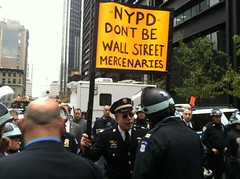 CAPTAIN RAY LEWIS: There’s a wide continuum there, Jonathan. For instance, Albany, NY, the mayor received a call from Governor Cuomo saying he wanted Occupy Albany eliminated. The mayor and police commissioner refused his request, they are allowing the protests in Albany as long as it’s peaceful and within the law. Subsequently those officers are treating them exemplary. There are other cities across the country where the same thing is happening, but then you also have the other extreme in Oakland and of course Zuccotti Park and University of California Davis are the epitomes of that. One thing I wanna put out about the UCD thing, he was obviously a sociopath should never have been given a badge, I cannot see how his previous behavior didn’t raise red flags, and I believe there were complaints about him prior but no action was taken. You can get away with certain types of behavior but it only emboldens you to commit more egregious acts. I saw a video tape from the scene that day but just the pepper spray incident, they don’t show the cops walking around a peaceful student protest with machine guns, assault rifles, automatic weapons. I cannot believe someone made the decision to send in riot police with automatic weapons, I was more shocked at that than the pepper spray. You’re always gonna have a deviant that does something like that. But to somebody up high, whoever was in charge there and perhaps the mayor even, the chancellor of the college approved of officers going in there for a college protest? That is incredibly outrageous.
CAPTAIN RAY LEWIS: There’s a wide continuum there, Jonathan. For instance, Albany, NY, the mayor received a call from Governor Cuomo saying he wanted Occupy Albany eliminated. The mayor and police commissioner refused his request, they are allowing the protests in Albany as long as it’s peaceful and within the law. Subsequently those officers are treating them exemplary. There are other cities across the country where the same thing is happening, but then you also have the other extreme in Oakland and of course Zuccotti Park and University of California Davis are the epitomes of that. One thing I wanna put out about the UCD thing, he was obviously a sociopath should never have been given a badge, I cannot see how his previous behavior didn’t raise red flags, and I believe there were complaints about him prior but no action was taken. You can get away with certain types of behavior but it only emboldens you to commit more egregious acts. I saw a video tape from the scene that day but just the pepper spray incident, they don’t show the cops walking around a peaceful student protest with machine guns, assault rifles, automatic weapons. I cannot believe someone made the decision to send in riot police with automatic weapons, I was more shocked at that than the pepper spray. You’re always gonna have a deviant that does something like that. But to somebody up high, whoever was in charge there and perhaps the mayor even, the chancellor of the college approved of officers going in there for a college protest? That is incredibly outrageous.
PHAWKER: In my opinion, the Occupy protests have revealed a few things to the American public and it’s not just the grotesque income inequality — the 99% vs. the 1%, etc. — but how militarized the police departments in this country have become. Second of all, it’s astonishing to me how brutal the response has been to unarmed peaceful protesters simply exercising their first amendment right to freedom of expression and assembly. Can you speak to that?
CAPTAIN RAY LEWIS: A major factor in the brutality is because the get away with it, there’s no accountability. Mayors aren’t demanding the police commissioners take action, they aren’t firing their commissioners for even having a staff of supervisors that allow this to go on. The white shirts are the supervisors and the blue shirts are the rank and file. Tne thing that amazed me is every picture I saw and every video I saw in Zuccotti Park, white shirts were as intensely engaged in the fighting as blue shirts, I’m thinking, my gosh they’re the ones who are supposed to be supervising. If you’re engaged in combat you aren’t supervising. Therefore the whole scene is unsupervised. When you have an unsupervised battle like that all hell is going to break loose.
PHAWKER: You’re in this for the long haul, where do you see this going and what would you like to see come out of the Occupy protests?
CAPTAIN RAY LEWIS: A major change in government. Basically getting corporations totally out of the government. The Supreme Court is corrupt. What was supposedly a legal authority we could be certain to count on, just voted that corporations are people. That compounds this problem. The power of the 1% is not just contributing to political elections but also their influence throughout society has got to be totally eliminated, they’re destroying not only people’s lives, they’re destroying the actual Earth, the air we breathe, the water we drink, they are destroying that all over the world. People accuse me of being Chicken Little running around saying, “The sky is falling,” but the science is on our side. The world is being destroyed. You have global warming deniers out there heavily funded by industries and the unfortunate thing here is people won’t wake up. If they do it will be too late, when we’re past the tipping point. You can stop all pollution and raping of the Earth immediately, but we’re past the point of correcting that situation. We’re coming close if not having passed it already to that tipping point.
